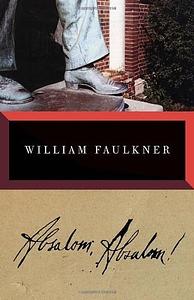Take a photo of a barcode or cover
What Faulkner is writing about is genius, specifically if you’re thinking of the time period in which he is writing it. However, the writing itself is so terrible. Sentences range from three words to thousands of words and paragraphs span pages. Needless to say, it can put you to sleep.
I don't know why I keep trying to force myself to read Faulkner. I just can't do it.
"He remembers how he did not return to his fire but stopped presently in a lonely place and leaned against a pine, leaning quietly and easily, with his head back so he could look up at the shabby shaggy branches like something in wrought iron spreading motionless against the chill vivid stars of early spring..."
"He remembers how he did not return to his fire but stopped presently in a lonely place and leaned against a pine, leaning quietly and easily, with his head back so he could look up at the shabby shaggy branches like something in wrought iron spreading motionless against the chill vivid stars of early spring..."
Oh boy. A novel about the dark, twisted south. With sprinkles of incest and copious amounts of racism. It's about life and death on a plantation run by a crazy guy trying to establish a dynasty. Oh yeah, and depending on the English major you ask, there are also some lesbians.
Oh the sentences that never end! I don't care for Faulkner's novels. Somehow his short stories are not nearly as frustrating to read.
Surprisingly, this characteristically overwritten Faulkner masterpiece reminded awfully of George Perec's Life A User's Manual. Why? Because, although this novel's protagonist's project is based on a childhood trauma of the discovery of class difference and prejudice rather than Perec's facetious whim of a rich but aimless Englishman, it's principally about a man who envisions a pattern for life and then sets out to complete it--both novels, trying not to spoil either too much, feature pretty predictable entropic outcomes for such chimeras, Perec's in a kind of clever puzzle-ey way and Faulkner in his own inimical racial-historical-apocalypse of entropy way.
Also both novels are at least equally abut story telling itself: Perec's in a clever mathematical (again) puzzle-ey way and Faukner's in a super messy non-linear crowd-sourced series of local legends way. In this both authors meld theme and form brilliantly and create similar masterpieces despite their having wholly different tones and settings.
Beyond the tragedy of Thomas Sutpen's childhood trauma, his vigorous attempt to then construct himself a gentleman who can do unto others as he was done unto, and the series of tragic disasters that the process manufactures and sees to (unto the third generation!) is also a kind of parabolic narrative correlating to the fatalistic U.S. South, unable to look the original sin of slavery, racism, or even simple classism in the eye, doomed to a self-loathing that usually carries a confederate flag and sports a tragically false boastfulness. Thus the ending of the novel, so poignant, so perspicacious. How do you read your family's and your nation's story, your history? What does it make you feel?
Also both novels are at least equally abut story telling itself: Perec's in a clever mathematical (again) puzzle-ey way and Faukner's in a super messy non-linear crowd-sourced series of local legends way. In this both authors meld theme and form brilliantly and create similar masterpieces despite their having wholly different tones and settings.
Beyond the tragedy of Thomas Sutpen's childhood trauma, his vigorous attempt to then construct himself a gentleman who can do unto others as he was done unto, and the series of tragic disasters that the process manufactures and sees to (unto the third generation!) is also a kind of parabolic narrative correlating to the fatalistic U.S. South, unable to look the original sin of slavery, racism, or even simple classism in the eye, doomed to a self-loathing that usually carries a confederate flag and sports a tragically false boastfulness. Thus the ending of the novel, so poignant, so perspicacious. How do you read your family's and your nation's story, your history? What does it make you feel?
This is a long and difficult book and I will never forget it. Because it is long and difficult, it requires a great deal of patience. My patience was rewarded and the streaming story is lodged in my memory. I cannot explain its brilliance in a short review.
Insanely good. It's obviously ridiculously long winded but when a book is this theatrical and beautifully constructed who even cares. Good predecessor to things like 100 years of solitude. However important to note that this book has some serious race issues to work out. One of the best books I've read this year.




